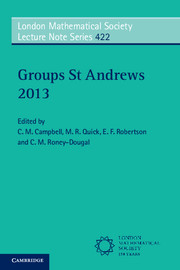Book contents
- Frontmatter
- Contents
- INTRODUCTION
- Approximate subgroups and super-strong approximation
- Width questions for finite simple groups
- Profinite properties of discrete groups
- GL(n, Z), Out(Fn) and everything in between: automorphism groups of RAAGs
- Permutation groups and transformation semigroups: results and problems
- New progress on factorized groups and subgroup permutability
- A survey on the normalizer problem for integral group rings
- A survey on Clifford-Fischer theory
- A generalisation on the solvability of finite groups with three class sizes for normal subgroups
- Automorphism groups of non-orientable Riemann surfaces
- What are the C2-groups?
- Resurrecting Wells’ exact sequence and Buckley's group action
- Recent work on Beauville surfaces, structures and groups
- Something for nothing: some consequences of the solution of the Tarski problems
- The groups of projectivities in finite planes
- On the relation gap and relation lifting problem
- Some results on products of finite subsets in groups
- Formal languages and group theory
- On the Castelnuovo-Mumford regularity of the cohomology of fusion systems and of the Hochschild cohomology of block algebras
- Recent advances on torsion subgroups of integral group rings
- On finite groups with small prime spectrum
- Solvability criteria for finite loops and groups
- The rational subset membership problem for groups: a survey
- A survey of Milnor laws
- Capable p-groups
- On the normal structure of a finite group with restrictions on the maximal subgroups
- Certain monomial characters and their normal constituents
- Recognition of finite quasi-simple groups by the degrees of their irreducible representations
- Generalized Baumslag-Solitar groups: a survey of recent progress
- Zeta functions of groups and rings – recent developments
Permutation groups and transformation semigroups: results and problems
Published online by Cambridge University Press: 05 September 2015
- Frontmatter
- Contents
- INTRODUCTION
- Approximate subgroups and super-strong approximation
- Width questions for finite simple groups
- Profinite properties of discrete groups
- GL(n, Z), Out(Fn) and everything in between: automorphism groups of RAAGs
- Permutation groups and transformation semigroups: results and problems
- New progress on factorized groups and subgroup permutability
- A survey on the normalizer problem for integral group rings
- A survey on Clifford-Fischer theory
- A generalisation on the solvability of finite groups with three class sizes for normal subgroups
- Automorphism groups of non-orientable Riemann surfaces
- What are the C2-groups?
- Resurrecting Wells’ exact sequence and Buckley's group action
- Recent work on Beauville surfaces, structures and groups
- Something for nothing: some consequences of the solution of the Tarski problems
- The groups of projectivities in finite planes
- On the relation gap and relation lifting problem
- Some results on products of finite subsets in groups
- Formal languages and group theory
- On the Castelnuovo-Mumford regularity of the cohomology of fusion systems and of the Hochschild cohomology of block algebras
- Recent advances on torsion subgroups of integral group rings
- On finite groups with small prime spectrum
- Solvability criteria for finite loops and groups
- The rational subset membership problem for groups: a survey
- A survey of Milnor laws
- Capable p-groups
- On the normal structure of a finite group with restrictions on the maximal subgroups
- Certain monomial characters and their normal constituents
- Recognition of finite quasi-simple groups by the degrees of their irreducible representations
- Generalized Baumslag-Solitar groups: a survey of recent progress
- Zeta functions of groups and rings – recent developments
Summary
Abstract
J.M. Howie, the influential St Andrews semigroupist, claimed that we value an area of pure mathematics to the extent that (a) it gives rise to arguments that are deep and elegant, and (b) it has interesting interconnections with other parts of pure mathematics.
This paper surveys some recent results on the transformation semigroup generated by a permutation group G and a single non-permutation a. Our particular concern is the influence that properties of G (related to homogeneity, transitivity and primitivity) have on the structure of the semigroup. In the first part of the paper, we consider properties of S = 〈G, a〉 such as regularity and idempotent generation. The second is a brief report on the synchronization project, which aims to decide in what circumstances S contains an element of rank 1. The paper closes with a list of open problems on permutation groups and linear groups, and some comments about the impact on semigroups are provided.
These two research directions outlined above lead to very interesting and challenging problems on primitive permutation groups whose solutions require combining results from several different areas of mathematics, certainly fulfilling both of Howie's elegance and value tests in a new and fascinating way.
Regularity and generation
Introduction
How can group theory help the study of semigroups?
If a semigroup has a large group of units, we can apply group theory to it. But there may not be any units at all! According to a widespread belief, almost all finite semigroups have only one idempotent, which is a zero, not an identity (see [25] and [18]). This conjecture, however, should not deter us from the general goal of investigating how the group of units shapes the structure of the semigroup. Infinitely many families of finite semigroups, and the most interesting, are composed by semigroups with a group of units. Some of those families are interesting enough to keep many mathematicians busy their entire lives; in fact a unique family of finite semigroups, the endomorphism semigroups of vector spaces over finite fields, has been keeping experts in linear algebra busy for more than a century.
- Type
- Chapter
- Information
- Groups St Andrews 2013 , pp. 128 - 141Publisher: Cambridge University PressPrint publication year: 2015

